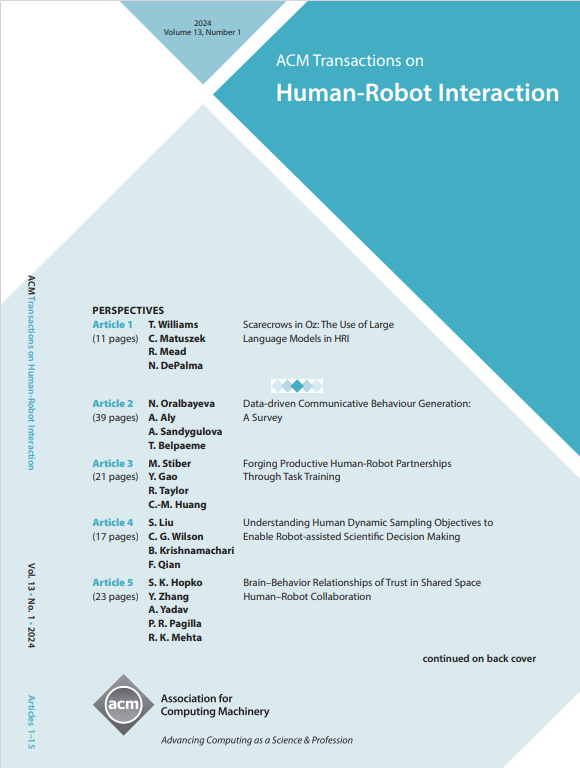嘿,机器人,你能帮我减少孤独感吗?一项探索性研究,旨在研究使用社交机器人减轻年轻人孤独感的潜力
IF 5.5
Q2 ROBOTICS
引用次数: 0
摘要
一个经常被遗忘的群体是深受孤独影响的年轻人。感知到的社会孤立往往源于依恋不安全感和社交技能不足。由于机器人可以作为社会互动伙伴,施加更少的社会压力,表现出更少的社会复杂性,它们可能会成为缓解这一问题的一种有希望的方法。目标不是取代人类的互动伙伴,而是减少严重的孤独感和伴随的有害影响,并发挥社交技能教练和练习互动伙伴的作用。为了探索这种方法的潜力,进行了一项预先注册的定量在线研究(N = 150),该研究结合了与社交机器人的视频互动和定性元素。第一项研究结果显示,年轻人在与机器人互动后的孤独感比之前有所减少。技术上具有仿射性的人对机器人的社交性以及与机器人的互动给予更积极的评价,而对机器人持消极态度的人则不那么积极。此外,人们报告的孤独感越多,他们认为机器人的社交能力就越差。本文章由计算机程序翻译,如有差异,请以英文原文为准。
Hey Robot, Can You Help Me Feel Less Lonely?: An Explorative Study to Examine the Potential of Using Social Robots to Alleviate Loneliness in Young Adults
An often-forgotten group of people which is heavily affected by loneliness are young adults. The perceived social isolation often stems from attachment insecurities and social skill deficiencies. Since robots can function as social interaction partners who exert less social pressure and display less social complexity, they may pose a promising approach to alleviate this problematic situation. The goal would not be to replace human interaction partners, but to diminish acute loneliness and accompanying detrimental effects and to function as social skills coach and practice interaction partner. To explore the potential of this approach, a preregistered quantitative online study (N = 150) incorporating a video-based interaction with a social robot and qualitative elements was conducted. First results show that young adults report less state loneliness after interacting with the robot than before. Technically affine people evaluate the robot's sociability as well as the interaction with it more positively, people with a general negative attitude towards robots less positively. Furthermore, the more trait loneliness people report to experience, the less sociable they perceive the robot.
求助全文
通过发布文献求助,成功后即可免费获取论文全文。
去求助
来源期刊

ACM Transactions on Human-Robot Interaction
Computer Science-Artificial Intelligence
CiteScore
7.70
自引率
5.90%
发文量
65
期刊介绍:
ACM Transactions on Human-Robot Interaction (THRI) is a prestigious Gold Open Access journal that aspires to lead the field of human-robot interaction as a top-tier, peer-reviewed, interdisciplinary publication. The journal prioritizes articles that significantly contribute to the current state of the art, enhance overall knowledge, have a broad appeal, and are accessible to a diverse audience. Submissions are expected to meet a high scholarly standard, and authors are encouraged to ensure their research is well-presented, advancing the understanding of human-robot interaction, adding cutting-edge or general insights to the field, or challenging current perspectives in this research domain.
THRI warmly invites well-crafted paper submissions from a variety of disciplines, encompassing robotics, computer science, engineering, design, and the behavioral and social sciences. The scholarly articles published in THRI may cover a range of topics such as the nature of human interactions with robots and robotic technologies, methods to enhance or enable novel forms of interaction, and the societal or organizational impacts of these interactions. The editorial team is also keen on receiving proposals for special issues that focus on specific technical challenges or that apply human-robot interaction research to further areas like social computing, consumer behavior, health, and education.
 求助内容:
求助内容: 应助结果提醒方式:
应助结果提醒方式:


